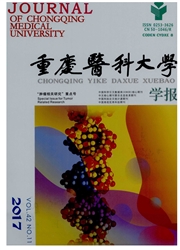

 中文摘要:
中文摘要:
急性肺损伤(acute lung ingury,ALI)和急性呼吸窘迫综合征(acute respiratory distress syndrome,ARDS)是ICU内危及患者生命的临床综合征。目前ARDS的病死率仍居高不下(〉40%)。其治疗和早期运用生物学标记诊断仍是重症医学领域的重大难题。高迁移率族蛋白B1(high mobility group box-1 protein,HMGB1)是一种新近发现的重要的晚期炎性介质,与脓毒症、恶性肿瘤、免疫性疾病等许多疾病相关。HMGB1作为一种警报素,其浓度的高低可以反映机体炎症及组织损伤的严重程度,并与疾病的预后密切相关。HMGB1可能会为阻断炎症通路的级联反应提供新的治疗靶点。本文就HMGB1在ALI/ARDS中的研究进展做一综述。
 英文摘要:
英文摘要:
Acute lung injury(ALI)and acute respiratory distress syndrome(ARDS)are life-threatening clinical syndromes in the intensive care unit. At present,ARDS mortality rate remains high(40%). Its treatment and the use of biological markers for early diagnosis are still major problems in the field of critical care medicine. High mobility group box-1 protein(HMGB1)has recently been identified as a new proinflammatory cytokine and late mediator of inflammation. It is associated with sepsis,cancer,autoimmune diseases and many other diseases. HMGB1 is an alarmin its concentration can reflect the severity of the inflammatory and tissue injury,and is closely related with the prognosis of the disease. Antagonizing HMGB1 can block the cascade of inflammatory pathways,which may provide a new therapeutic target for the treatment of ARDS.In this paper,we reviewed on the role of HMGB1 in ALI/ARDS.
 同期刊论文项目
同期刊论文项目
 同项目期刊论文
同项目期刊论文
 期刊信息
期刊信息
